人教九年级英语上册-Unit 1 语法专题
人教版九年级上册英语Unit 1:Uni 1 重点语法
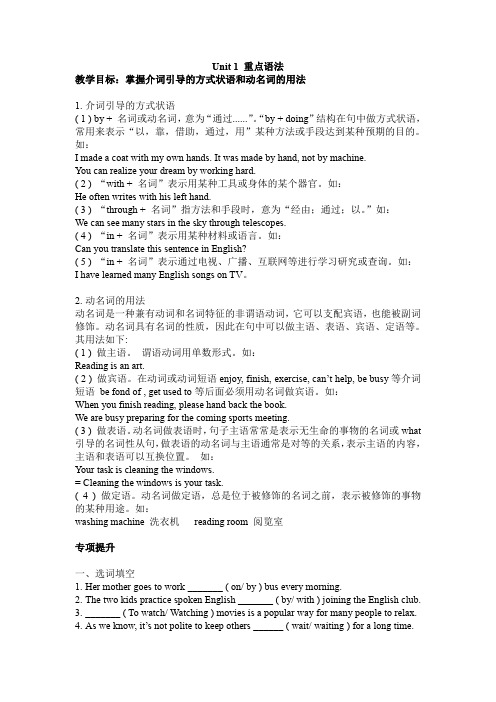
Unit 1 重点语法教学目标:掌握介词引导的方式状语和动名词的用法1.介词引导的方式状语( 1 ) by + 名词或动名词,意为“通过......”。
“by + doing”结构在句中做方式状语,常用来表示“以,靠,借助,通过,用”某种方法或手段达到某种预期的目的。
如:I made a coat with my own hands. It was made by hand, not by machine.You can realize your dream by working hard.( 2 ) “with + 名词”表示用某种工具或身体的某个器官。
如:He often writes with his left hand.( 3 ) “through + 名词”指方法和手段时,意为“经由;通过;以。
”如:We can see many stars in the sky through telescopes.( 4 ) “in + 名词”表示用某种材料或语言。
如:Can you translate this sentence in English?( 5 ) “in + 名词”表示通过电视、广播、互联网等进行学习研究或查询。
如:I have learned many English songs on TV。
2.动名词的用法动名词是一种兼有动词和名词特征的非谓语动词,它可以支配宾语,也能被副词修饰。
动名词具有名词的性质,因此在句中可以做主语、表语、宾语、定语等。
其用法如下:( 1 ) 做主语。
谓语动词用单数形式。
如:Reading is an art.( 2 ) 做宾语。
在动词或动词短语enjoy, finish, exercise, can’t help, be busy等介词短语be fond of , get used to等后面必须用动名词做宾语。
如:When you finish reading, please hand back the book.We are busy preparing for the coming sports meeting.( 3 ) 做表语。
Unit1 - 重点语法 人教版九年级英语上册
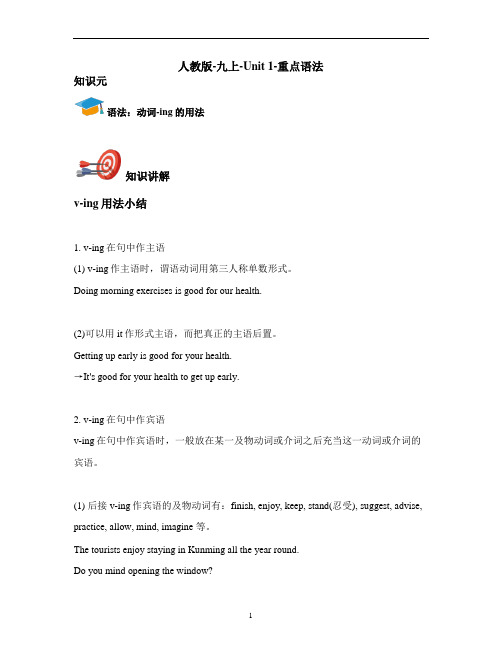
人教版-九上-Unit 1-重点语法知识元语法:动词-ing的用法知识讲解v-ing用法小结1. v-ing在句中作主语(1) v-ing作主语时,谓语动词用第三人称单数形式。
Doing morning exercises is good for our health.(2)可以用 it作形式主语,而把真正的主语后置。
Getting up early is good for your health.→It's good for your health to get up early.2. v-ing在句中作宾语v-ing在句中作宾语时,一般放在某一及物动词或介词之后充当这一动词或介词的宾语。
(1) 后接v-ing作宾语的及物动词有:finish, enjoy, keep, stand(忍受), suggest, advise, practice, allow, mind, imagine 等。
The tourists enjoy staying in Kunming all the year round.Do you mind opening the window?(2) v-ing作介词的宾语,包括以介词结尾的动词短语,如:give up, take part in,be good at等。
I know you are good at drawing pictures.Many young people took part in planting trees on Tree Planting Day.例题精讲语法:动词-ing的用法例1.用括号内所给单词的适当形式填空1. Do you often memorize new words by_____ (make) vocabulary lists?2. Can you finish ________ (do) your homework before nine o’clock?3. Don’t worry about _________ (make) mistakes when you talk to foreigners in English.4. _______(help) each other at school _______ (be) a way to improve our friendship.5. We have worked for three hours. Let’s stop _______ (work) and have a rest.【答案】makingdoingmakingHelping/ isworking【解析】题干解析:语法:介词by的用法知识讲解用法词义例句表示方式、方法或手段,后接名词或动词-ing 意为“使用某物;靠;乘(车、船)等”Do you learn English byreading aloud?形式表示时间意为“到……时(为止);在……以前、不迟于”I have to go to bed by ten o'clock.表示地点、位置意为“靠近;在……旁边”The boy often reads booksby the river.表示移动的方向意为“从……旁边过”He walked by me withoutspeaking.用在反身代词之前意为“独自”Tina couldn’t move theheavy box by herself.表示动作执行者,用于被动语态意为“被; 由”The house was destroyed byfire.用于某些固定短语中by the way 顺便问一下one by one 一个接一个地step by step 一步一步地by accident 偶然地例题精讲语法:介词by的用法例1.根据提示完成句子1. — How do you learn English?— I learn ________________________ (通过小组学习).2. —Do you learn English ________________________ (通过大声阅读)?—Yes, I do. It helps my pronunciation.3. —How can I read faster?—You can read faster ____________________ (通过按照意群读的方式).4. —How can I improve my pronunciation?—One way is ________________________ (通过听录音).5. I enjoy practicing my English ___________________(和同班同学交谈). 【答案】by studying with a groupby reading aloudby reading word groupsby listening to tapesby talking with my classmates【解析】题干解析:当堂练习单选题练习1.—Excuse me, could you tell me how I can learn English well?—_________ reading and speaking more.A.By B.InC. On D.At【答案】A【解析】题干解析:练习2.—How do you learn English so well?—______ chatting with my uncle in America online.A.For B. ByC. In D.With【答案】B【解析】题干解析:单句填空练习1.根据图画情景、提示词语及句末标点编写句子(注意:要用by doing sth.结构)1. Ann, practice, English, have conversations_______________________________________________________________.2. Mike, improve, pronunciation_______________________________________________________________?3. Dale, improve, write, pen pals_______________________________________________________________.4. Grace, learn, grammar, ask, teacher_______________________________________________________________?5. Helen, learn, English, read the textbook_______________________________________________________________. 【答案】Ann practices her English by having conversations with friends.Does Mike improve his pronunciation by watching English programs?Dale improves his writing by writing to his pen pals.Does Grace learn grammar by asking the teacher for help?Helen learns English by reading the textbook.【解析】题干解析:。
人教版九年级上册第一单元语法知识点

人教版九年级上册第一单元语法知识点
Unit1:Howcanwebecomegood1earners?
第一单元的语法重点是:"by+V-ing”结构详解;提建议的句式。
by+V-ing:
★“by+V-ing”结构在句子中作方式状语,常用来表示“以、靠、借助、通过、用(某种方法或手段)”而达到某种预期的目的。
该结构常用来回答Howdoyou...?之类的问题。
★当by和表示交通工具的名词连用时,它与名词之间不用任何限定词,且名词用单数形式。
Theyoftengotoschoo1bySUbWay.他们经常坐地铁上学。
★by,in和With都可以表示“通过;借助by后接表示动作、行为的名词;in表示“用某种语言;用某种材料”;Mth后接表示物体或工具的名词。
如:YoumaysendthebookbyPoSt.你可以通过邮局把书寄出去。
提建议句式:
①What/howabout+doingsth.?
如:What/Howaboutgoingshopping?
②Whydon,tyou+dosth.?
如:Whydon,tyougoshopping?
③Whynot+dosth.?
如:Whynotgoshopping?
(4)1et,s+dosth.
如:1et,sgoshopping
⑤ShaI1we/I+dosth.?
如:Sha11we/Igoshopping?。
人教版九年级上册Unit1语法、阅读、写作专题

人教版九年级上册Unit1语法、阅读、写作专题语法专题一、by+动名词1."by+动名词"在句中常作方式状语,表示方法、手段、途径等,意为“通过……;用……借助……”,其位置可在句首或句末。
例:By getting up early,I can have an hour reading English in the morning.靠起得早我早晨有一个小时的时间朗读英语。
He improved his listening by listening English songs他通过听英文歌曲提高了听力(水平)。
链接中考(重庆中考)You can improve your English ______practicing more.A.byB. withC. ofD.in解析:空格后 practicing more(多练习)是 improve your English(提高你的英水平)的一种途径,by此处意为“通过”。
句意:你可以通过多练习来提高你的英语水平。
选A。
2.“by+动名词”可以用来回答how引导的特殊疑问句。
例:-How will you catch up with your classmates?你将怎样赶上你的同班同学-By working hard.通过努力学习。
-How do you learn math?你是如何学习数学的?-I learn by doing exercises.我通过做练习学习。
知识拓展(1)with+名词,表示用某种工具或自身的某种器官。
She often writes with her left hand.她经常用她的左手写字。
(2)in+名词,表示用某种材料或语言。
Now he begins to paint in oils.现在他开始画油画了。
方法技巧by, with与inby方式及方法,with有形的工具,语言材料in替换。
二、现在完成时现在完成时的谓语由“助动词have/has+动词的过去分词”构成。
最新初中人教版九年级英语上册unit1 句型语法
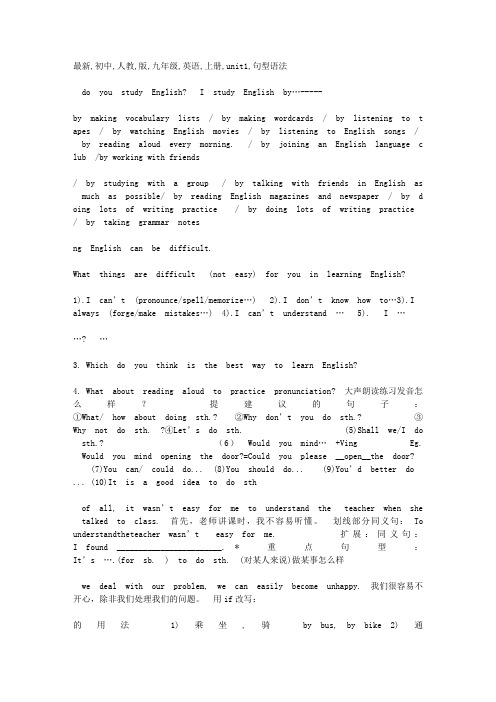
最新,初中,人教,版,九年级,英语,上册,unit1,句型语法do you study English? I study English by…-----by making vocabulary lists / by making wordcards / by listening to t apes / by watching English movies / by listening to English songs / by reading aloud every morning. / by joining an English language c lub /by working with friends/ by studying with a group / by talking with friends in English as much as possible/ by reading English magazines and newspaper / by d oing lots of writing practice / by doing lots of writing practice / by taking grammar notesng English can be difficult.What things are difficult (not easy) for you in learning English?1).I can’t(pronounce/spell/memorize…) 2).I don’t know how to…3).I always (forge/make mistakes…)4).I can’t understand … 5). I ……?…3. Which do you think is the best way to learn English?4. What about reading aloud to practice pronunciation? 大声朗读练习发音怎么样?提建议的句子:①What/how about doing sth.? ②Why don’t you do sth.? ③Why not do sth. ?④Let’s do sth. (5)Shall we/I do sth.? (6)Would you mind…+Ving Eg.Would you mind opening the door?=Could you please __open__the door?(7)You can/ could do... (8)You should do... (9)You’d better do ... (10)It is a good idea to do sthof all, it wasn’t easy for me to understand the teacher when she talked to class. 首先,老师讲课时,我不容易听懂。
人教版九年级英语上册第一单元语法
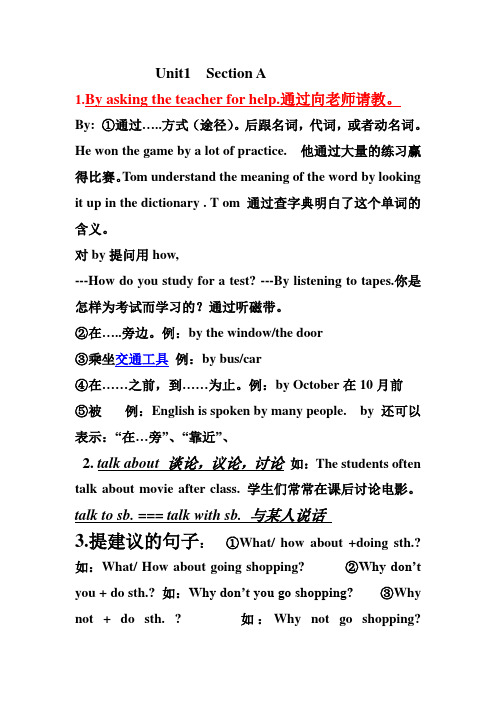
Unit1 Section A1.By asking the teacher for help.通过向老师请教。
By: ①通过…..方式(途径)。
后跟名词,代词,或者动名词。
He won the game by a lot of practice. 他通过大量的练习赢得比赛。
Tom understand the meaning of the word by looking it up in the dictionary . T om 通过查字典明白了这个单词的含义。
对by提问用how,---How do you study for a test? ---By listening to tapes.你是怎样为考试而学习的?通过听磁带。
②在…..旁边。
例:by the window/the door③乘坐交通工具例:by bus/car④在……之前,到……为止。
例:by October在10月前⑤被例:English is spoken by many people. by 还可以表示:“在…旁”、“靠近”、2. talk about 谈论,议论,讨论如:The students often talk about movie after class. 学生们常常在课后讨论电影。
talk to sb. === talk with sb. 与某人说话3.提建议的句子:①What/ how about +doing sth.? 如:What/ How about going shopping? ②Why don’t you + do sth.? 如:Why don’t you go shopping? ③Why not + do sth. ? 如:Why not go shopping?④Let’s + do sth. 如:Let’s go shopping⑤Shall we/ I + do sth.? 如:Shall we/ I go shopping?4. I learned a lot that way. 通过那种方式我学了很多。
人教九年级英语Unit1单元语法专项课件

Ⅱ.根据汉语意思完成句子 1.“你是怎样提高你的写作水平的? ” “通过每天写一篇日记的方式。” —__H_o_w__ do you improve your writing? —__B_y___ _w_r_i_ti_n_g____ a diary every day. 2.我们打算乘火车去巴黎。 We are going to Parisb_y______tr_a_in________. 3.这双鞋是手工做的。 This pair of shoes are madbey ______ha_n_d________.
含义 在……旁;
靠近
经过
用;靠;通过
不迟于
被;由(后跟 动作执行者)
例句
Our teacher was sitting by the door. 我们的老师正坐在门旁边。
He walked by me without speaking. 他走过我的身旁,没有说话。
I know it by heart. 我把它记在心头。
Unit1 How can we become good learners?
单元语法讲解
—by引导的方式状语
语法点击
by的用法 1. 构成“by+动名词”结构,表示“通过……的方式;以 ……的方式”。该结构在句中可以作方式状语,也可以作表 语。
常用表达 1. I had some trouble remembering new words. 2. I don't know how to improve my reading skill. 3. He has made great progress in his English study. 4. I was praised by the teacher for my progress in English. 5. I learned a lot from the class. First, my reading skill improved and my vocabulary grew.
人教版九上英语 Unit 1 单元语法专题(Grammar Focus~4c)

(独d自ay一by
人da)y .
5.As long as we keep practicing,our spoken English will be
improved
(一天天).
三、单项选择
( D )1.[2022·云南]—How do you relax in your free time?
—
doing sports and listening to music.
(句型) have you learned this
week?
三、阅读还原(有一项多余) [2022·湖北三市联考] the other hand, this will make reviewing easier. e is some advice to help improve your memory. other piece of advice is to review at a proper time. u have to read the whole book from the beginning to the end. t’s easy to memorize the important information in the morning. er a month, you will find that you can remember the material easily.
always easier to remember only the key points.3.
When you
open your book , the colored parts will show you the most
important parts at once.In this way,you needn’t read every word
人教版九年级全一册英语Unit1单元语法知识点总结
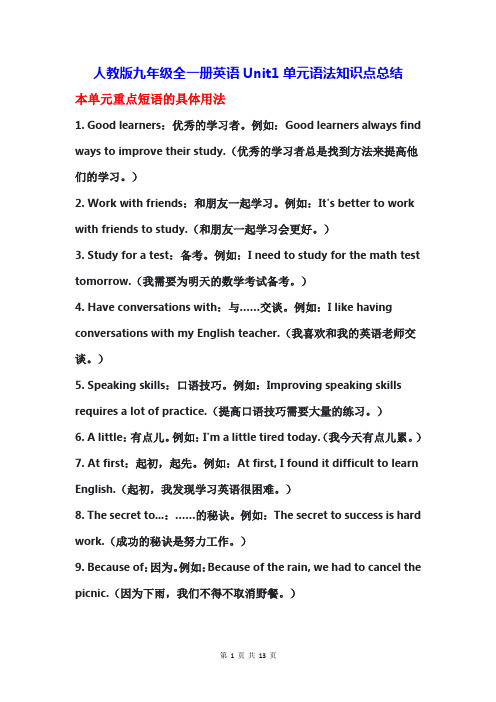
人教版九年级全一册英语Unit1单元语法知识点总结本单元重点短语的具体用法1. Good learners:优秀的学习者。
例如:Good learners always find ways to improve their study.(优秀的学习者总是找到方法来提高他们的学习。
)2. Work with friends:和朋友一起学习。
例如:It's better to work with friends to study.(和朋友一起学习会更好。
)3. Study for a test:备考。
例如:I need to study for the math test tomorrow.(我需要为明天的数学考试备考。
)4. Have conversations with:与……交谈。
例如:I like having conversations with my English teacher.(我喜欢和我的英语老师交谈。
)5. Speaking skills:口语技巧。
例如:Improving speaking skills requires a lot of practice.(提高口语技巧需要大量的练习。
)6. A little:有点儿。
例如:I'm a little tired today.(我今天有点儿累。
)7. At first:起初,起先。
例如:At first, I found it difficult to learn English.(起初,我发现学习英语很困难。
)8. The secret to...:……的秘诀。
例如:The secret to success is hard work.(成功的秘诀是努力工作。
)9. Because of:因为。
例如:Because of the rain, we had to cancel the picnic.(因为下雨,我们不得不取消野餐。
人教版九年级上册英语 Unit 1 词汇与语法基础(解析版)
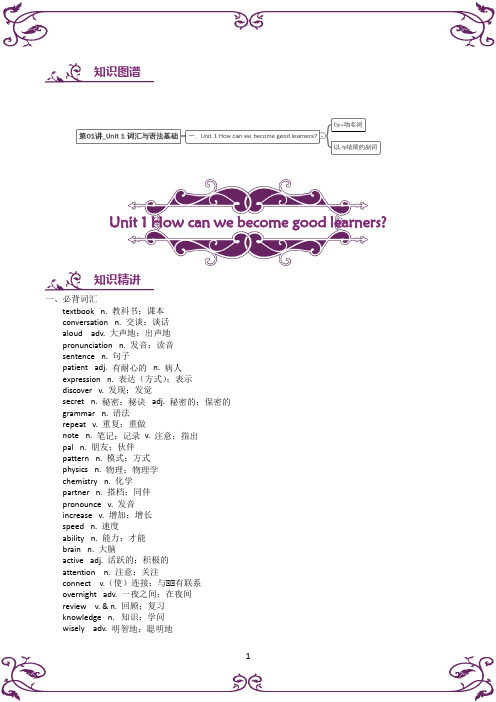
知识图谱Unit 1 How can we become good learners?知识精讲一、必背词汇textbook n. 教科书;课本conversation n. 交谈;谈话aloud adv. 大声地;出声地pronunciation n. 发音;读音sentence n. 句子patient adj. 有耐心的n. 病人expression n. 表达(方式);表示discover v. 发现;发觉secret n. 秘密;秘诀adj. 秘密的;保密的grammar n. 语法repeat v. 重复;重做note n. 笔记;记录v. 注意;指出pal n. 朋友;伙伴pattern n. 模式;方式physics n. 物理;物理学chemistry n. 化学partner n. 搭档;同伴pronounce v. 发音increase v. 增加;增长speed n. 速度ability n. 能力;才能brain n. 大脑active adj. 活跃的;积极的attention n. 注意;关注connect v.(使)连接;与⋯⋯有联系overnight adv. 一夜之间;在夜间review v. & n. 回顾;复习knowledge n. 知识;学问wisely adv. 明智地;聪明地二、重点词汇1. aloud adv.in a voice loud enough to be heard例句:He read her letter aloud to the rest of the family.他把她的信大声读给家人听。
2. discover v.to find information, a place, or an object, especially for the first time(尤指首次)发现,找到例句:We searched all morning for the missing papers and finally discovered them in a drawer.我们一上午都在找那些失踪的文件,最后终于在一个抽屉里找到了。
人教版九年级英语Unit1知识点总结

Unit1 How can we become good learners?一、语法点:介词by的用法1. by doing sth. 通过做某事的方式eg: —How can you improve your pronunciation? —By listening to tapes.2. 表示传达、传递的方式或媒介eg:How did you tell him about it, by letter or by e-mail?3. by + 交通工具eg: Every day I go to school by school bus.4. 在……的旁边eg: I’m sitting by the lake.5. 不迟于、在…之前eg: Please come home by 10 p.m.6. 创作eg: I have already read the book by Mo Yan.二、知识点1. by asking the teacher for help①by 介词通过,表示通过某种方式by doing sth. 通过做某事的方式eg: We visited Beijing University by riding bikes last weekend.②与ask相关的短语ask sb. for sth. 向某人要某物eg: He always asks his parents for money.ask sb. about sth. 向某人询问某事eg: Can I ask you about the result of test?ask sb. ( not) to do sth. 要求某人(不)做某事eg: My mother asks me not to play in the street.2. Do you have conversations with friends in English?have conversations with sb. = have a conversation with sb.与某人交谈/谈话make a conversation 编对话3. What about reading aloud to practice pronunciation?①aloud adv. 大声地;出声地eg: We should read English aloud. 我们应该大声读英语②practicev. 练习practice doing sth. 练习做某事eg: They practice speaking English every morning.n. 练习(不可数名词)eg: Students get practice in the English club.4. I’ve learned a lot (in) that way.in this/that way 用这种/那种方式5. Don’t read word by word.①word by word 一个字一个字的eg: He often read English word by word.②和word by word类似的短语有:day by day 一天天地one by one 一个一个地6. Well, be patient. It takes time.patientadj.耐心的①be patient with sb. 对某人有耐心eg: Our teachers are patient with us.②be patient to do sth. 有耐心做某事eg: Teachers should be patient to teach students.n. 病人eg: There are many patients in the hospital.7. The more you read, the faster you’ll be.the+比较级,the+比较级越…… 越……eg: The more you practice, the better you can understand.8. Why did Wei Fen find it difficult to learn English?find it + adj. + (for sb.) + to do sth. 发现做某事(对于某人)是…make it + adj.+ (for sb.) + to do sth. 使(某人)做某事成为…think it + adj. + (for sb.) + to do sth. 认为做某事(对于某人)是…feel it + adj. + (for sb.) + to do sth. 感觉做某事(对于某人)是…eg: Computers make it easier to keep in touch with friends.电脑使我们获得消息更容易了。
人教版九年级英语 Unit1 词汇,句型,语法和练习(附:作文两篇)
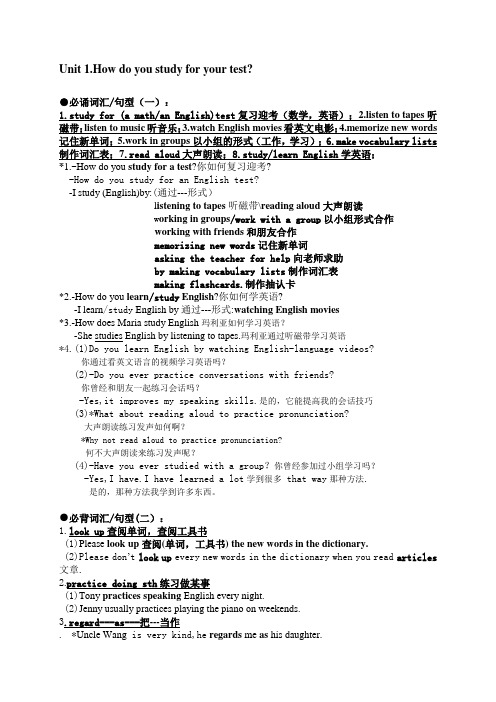
Unit 1.How do you study for your test?●必诵词汇/句型(一):1.study for (a math/an English)test复习迎考(数学,英语);2.listen to tapes听磁带;listen to music听音乐;3.watch English movies看英文电影;4.memorize new words 记住新单词;5.work in groups以小组的形式(工作,学习);6.make vocabulary lists 制作词汇表;7.read aloud大声朗读;8.study/learn English学英语;*1.-How do you study for a test?你如何复习迎考?-How do you study for an English test?-I study (English)by:(通过---形式)l istening to tapes听磁带\reading aloud大声朗读w orking in groups/work with a group以小组形式合作working with friends和朋友合作memorizing new words记住新单词asking the teacher for help向老师求助by making vocabulary lists制作词汇表making flashcards.制作抽认卡*2.-How do you learn/study English?你如何学英语?-I learn/study English by通过---形式:watching English movies*3.-How does Maria study English玛利亚如何学习英语?-She studies English by listening to tapes.玛利亚通过听磁带学习英语*4.(1)Do you learn English by watching English-language videos?你通过看英文语言的视频学习英语吗?(2)-Do you ever practice conversations with friends?你曾经和朋友一起练习会话吗?-Yes,it improves my speaking skills.是的,它能提高我的会话技巧(3)*What about reading aloud to practice pronunciation?大声朗读练习发声如何啊?*Why not read aloud to practice pronunciation?何不大声朗读来练习发声呢?(4)-Have you ever studied with a group?你曾经参加过小组学习吗?-Yes,I have.I have learned a lot学到很多 that way那种方法.是的,那种方法我学到许多东西。
人教版九年级英语上册课件:Unit 1 单元语法精讲与精练(共13张PPT)
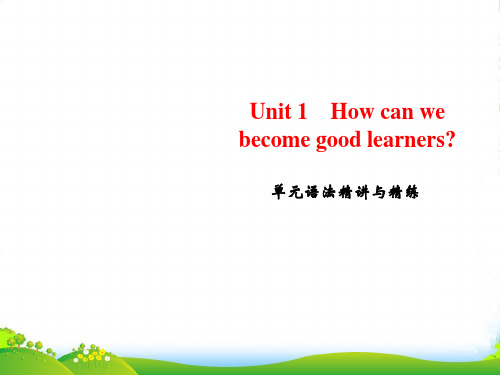
二、根据汉语意思完成句子。
1.我妈妈经常骑自行车去上班,我总是乘地铁上学。 My mother often goes to work _b__y__ __b_i_k_e__. I always go to school __b_y__ ___su__b_w_a_y__. 2.—你怎样备考?—我通过小组合作学习。 —__H__o_w__ do you study for a test? —I study __b_y__ _w__o_r_k_in_g__ with a group.
2.动名词在句中作宾语 动名词在句中作宾语时,一般放在某一及物动词或介词之后充当这一动词或 介词的宾语。 (1)后接动名词作宾语的及物动词有: finish,enjoy,keep,stand(忍受),suggest,advise,practice,mind,imagine 等。如: The tourists enjoy staying in Kunming all the year round.游客们喜欢一整年都 待在昆明。 Do you mind opening the window? 你介意打开窗户吗?
我们,还在路上……
now. A.speak
B.to speak
C.spoken
D.speaking
the old that he gave up his loudly when I passed by just
( D )3.(广州中考)Sarah,you'd better drink moБайду номын сангаасe water after
些善于独立思考的人,给那些具有锲而不舍的人。2022年4月上午2时49分22.4.1902:49April 19, 2022 • 3、书籍—通过心灵观察世界的窗口.住宅里没有书,犹如房间里没有窗户。2022年4月19日星期二2时49分10秒02:49:1019 April 2022
人教版九年级英语 Unit 1 重要语法知识点总结
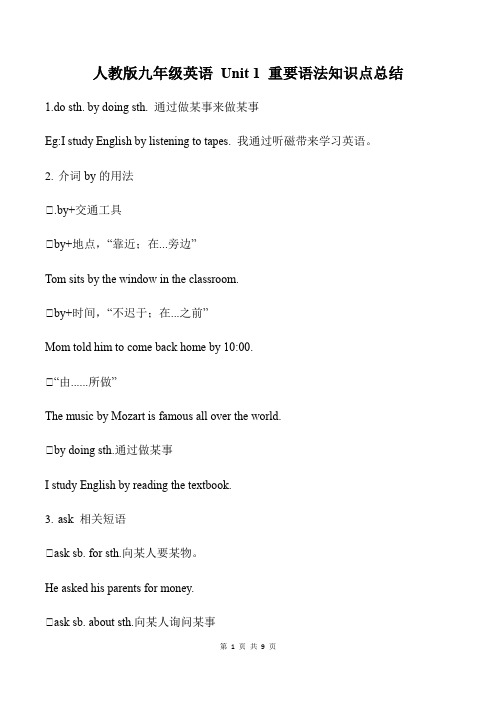
人教版九年级英语Unit 1 重要语法知识点总结1.do sth. by doing sth. 通过做某事来做某事Eg:I study English by listening to tapes. 我通过听磁带来学习英语。
2.介词by的用法①.by+交通工具①by+地点,“靠近;在...旁边”Tom sits by the window in the classroom.①by+时间,“不迟于;在...之前”Mom told him to come back home by 10:00.①“由......所做”The music by Mozart is famous all over the world.①by doing sth.通过做某事I study English by reading the textbook.3.ask 相关短语①ask sb. for sth.向某人要某物。
He asked his parents for money.①ask sb. about sth.向某人询问某事Can I ask about the result of the match?我可以问一下比赛的结果吗?①ask sb.(not) to do sth.要求某人(不)做某事(被动语态)--be asked (not) to do sth.被要求(不)做某事My mother asked me not to play in the street.4.have conversations with friends in English和朋友用英语交谈5.speaking skills 口语技能spoken English 英语口语6.read aloud 朗读 a little nervous 有点儿紧张7.It’s +adj.+(for sb.)+to do sth.做某事对某人来说是怎么样的。
It’s easier for you to pay attention to it for a long time.对于你来说长时间集中注意力在它(你感兴趣的事儿)上面是也更容易的。
人教版初三英语上unit1语法讲解及练习

【重点短语】Unit 1: How do you study for a test?查阅构成;编造取笑(某人)谈论,讨论与某人说话将…视为..忽然中断;中断以…结束出错误不敢去做一点也不英语口语做笔记【重点语法】解决(时间) 过去在某人的协助下=决定做某事练习做某事紧张某人/ 某事=尽某人最大努力对某人感到愤怒愉快地做某事做某事有困难1.动名词在动词后加ing 为动名词doing,相称于名词,在句子中能够做主语、宾语、表语、定语等。
(1)作主语(谓语为第三人称单数)Memorizing the words of pop songs also helps a little.记流行歌曲的词也起作用。
Swimming is good for our health.(2)作宾语在动词(keep\practice\finish \enjoy\hate\be busy\mind) 后只用—ing 作宾语Eg. We should keep speaking English in class.He often practices singing in the morning.I have finished reading the book.Would you mind opening the door?(3)作表语Babysister’s job is washing,cooking and taking care of the children.(4)作定语I think that doing a lot of listening practice is one of the secrets……2.动词不定式及动名词在句中成分(1)做定语—后置The best way to learn English is reading aloud.The fastest way to travel is by plane(2)与所修饰的名词构成动宾关系I need a pen to write with.I don’t have a partner to practice English with.I need some paper to write on.I don’t have a room to live in.3.现在完毕时复习A.表达过去发生或已经完毕的动作对现在造成的影响或成果,或从过去已经开始,持续到现在的动作或状态。
人教版九年级英语上册第一单元语法新编完整版
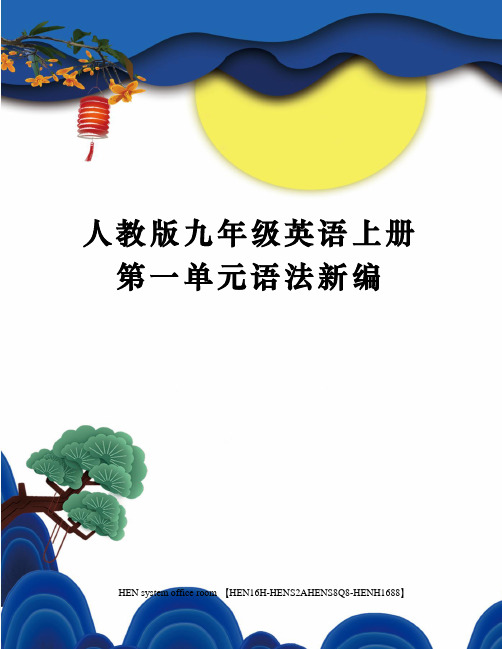
人教版九年级英语上册第一单元语法新编 HEN system office room 【HEN16H-HENS2AHENS8Q8-HENH1688】Unit1 Section A1.By asking the teacher for help.通过向老师请教。
By: ①通过…..方式(途径)。
后跟名词,代词,或者动名词。
He won the game by a lot of practice. 他通过大量的练习赢得比赛。
Tom understand the meaning of the word by looking it up in the dictionary . T om 通过查字典明白了这个单词的含义。
对by提问用how,---How do you study for a test ---By listening to tapes.你是怎样为考试而学习的通过听磁带。
②在…..旁边。
例:by the window/the door③乘坐例:by bus/car④在……之前,到……为止。
例:by October在10月前⑤被例:English is spoken by many people. by 还可以表示:“在…旁”、“靠近”、2. talk about 谈论,议论,讨论如:The students often talk about movie after class. 学生们常常在课后讨论电影。
talk to sb. === talk with sb. 与某人说话3.提建议的句子:①What/ how about +doing sth. 如:What/ How about going shopping ②Why don’t you + do sth. 如:Why don’t you go shopping ③Whynot + do sth. 如:Why not go shopping④Let’s + do sth. 如:Let’s go shopping⑤Shall we/ I + do s th. 如:Shall we/ I go shopping4. I learned a lot that way. 通过那种方式我学了很多。
人教版九年级英语全一册:Unit 1 语法知识点复习提纲(全面,必备!)

人教版九年级英语全一册:Unit 1语法知识点复习提纲重点短语、重点句型知识点、交际用语、语法、单元同步书面表范文达大全Unit 1 How can we become good learners?一、重点短语Section A 1a-1c1.成为优秀的学习者become good learners2.和朋友一起合作学习work with friends3.制作单词卡片make word cards4.阅读课本read the textbook5.听录音带,听磁带listen to tapes6.向某人寻求帮助ask sb. for help7.向老师求助/寻求帮助ask the teacher for help7.备考,为考试而学习study for a test/an exam8.小组合作学习study/work with a groupSection A 2a-2d9.学习英语learn English10.看录像watch videos11.和某人进行对话/会话have conversations with sb./have a conversation with sb.12.用英语in English13.做某事怎么样how /what about14.朗读read aloud15.很多,常常,非常a lot16.说话技巧speaking skills17.英语口语spoken English/oral English18.书面英语written English19.以这种方式in this way/that way20.以那种方式in that way/this way21.太......而不能做某事too...to...22.一点,有点a little23.做报告/演讲give a report24.下星期一next Monday25.理解大意get the main ideas26.最初,首先at first27.逐词逐句,逐词逐字word by word28.词组,短语word groups29.许多单词many of the words30.使用词典use a dictionary31.猜测词义guess a word’s meaning32.超过,多余more than=over33.需要时间,需要花时间。
人教版英语九上各单元重要语法知识点

人教版英语九上各单元重要语法知识点在学习英语时,语法是一个非常重要的环节。
掌握好英语的语法知识,对于提高英语水平有着非常重要的作用。
下面将分别介绍人教版英语九上各单元的重要语法知识点,希望能够对大家有所帮助。
第一单元重点语法知识点:动词的时态1. 一般现在时:表示经常性或习惯性的动作,也可用于表示客观事实、真理、格言、警句等。
2. 一般过去时:表示过去某个时间发生的动作,或者过去常常发生的动作,也可用于表示过去的状态和习惯。
3. 一般将来时:表示将来某个时间将要发生的动作或情况,还可以表示计划、安排和意图等。
第二单元重点语法知识点:形容词和副词的比较级和最高级1. 形容词的比较级:在两个人或事物之间进行比较时,用来表示一个比另一个更高一些的程度。
2. 形容词的最高级:用来表示三者及三者以上的人或事物相互比较,表示最高程度。
3. 副词的比较级和最高级:和形容词的比较级和最高级用法相似,主要用于修饰动词、形容词和其他副词。
第三单元重点语法知识点:动词不定式1. 作宾语:作为动词的宾语,通常用动词不定式的基本形式。
2. 作宾语补足语:常用在某些及物动词之后,表示宾语的具体内容。
3. 作状语:通常用于说明谓语动词的动作的目的或意图。
第四单元重点语法知识点:定语从句1. 修饰名词或代词:用来对名词或代词进行修饰,一般用在被修饰的名词或代词之后。
2. 关系代词和关系副词:在定语从句中,关系代词有that, which, who, whom, whose等;关系副词有where, when, why等。
3. 关系代词和关系副词在定语从句中的使用。
第五单元重点语法知识点:情态动词1. can/could:表示能力、许可、请求;can用于一般现在时,could 用于一般过去时。
2. may/might:表示可能、许可、请求;may用于一般现在时,might用于一般过去时。
3. must:表示推测、肯定、命令等意义;只能用于一般现在时。
